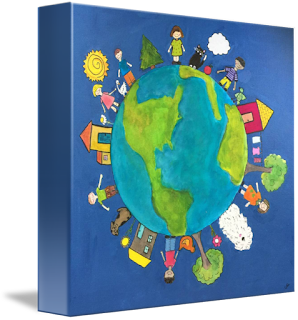2. Make an Earth Day Snack that is Healthy and fun to make.
 Gather these healthy food items: celery, cherry tomatoes, kiwi, grapes, apple slices, peanut butter, oranges, etc. Talk about the different bugs and insects that live in the earth. How do they help the earth? How do they help us? What size are they? What colors? What work do they do? After your class discussion, start to make your little creatures with the food items for snack. More questions: Is this a healthy snack? Why do you think so? Why should we eat healthy?
Gather these healthy food items: celery, cherry tomatoes, kiwi, grapes, apple slices, peanut butter, oranges, etc. Talk about the different bugs and insects that live in the earth. How do they help the earth? How do they help us? What size are they? What colors? What work do they do? After your class discussion, start to make your little creatures with the food items for snack. More questions: Is this a healthy snack? Why do you think so? Why should we eat healthy?
3. Plant some wheat grass. Students learn about living things
when they can be involved. Caring for plants is always a great activity with children because they learn responsibility and kindness. Growing wheat grass is fast!
when they can be involved. Caring for plants is always a great activity with children because they learn responsibility and kindness. Growing wheat grass is fast!
5. Clean-UP Our School Grounds on Earth Day - Adventure outdoors for picking up any trash around the school grounds. Work with the buddy system. Each student has a buddy as they walk around the school to find any items or trash to be cleaned up.
6. Conserve resources: turn out lights when not needed, repurpose school supplies,
7. Make Art on Earth Day: Show in any art form what Earth Day, Everyday means to you.
 |
| Earth Day Art |
Think Globally, but Act Locally
What does that saying mean? Talk about how local people and their actions help everyone.
Reading Your Favorite Books for Earth Day:
 |
| Reader Response Pages and Reading Booklet |
Interactive Reading Booklet and Everything you need for your readers to respond to this book, The Very Hungry Caterpillar, by Eric Carle. This classic book is a perfect read aloud in every classroom. Grab these reader response pages and 2 interactive reading booklets to enhance the reading experience. Your students will love making these booklets, and retelling the story at home.
Reader Response Pages Include:
- story events
- days of the week
- handwriting practice
- retelling the story
- cloze activity
- vocabulary cards for your writing center and pocket chart
- story event cards for retelling the story
- teacher directions
 |
| Book Companion for Young Readers |
Reader Response Pages and Graphic Organizers for
My Garden, by Kevin Henkes.
Read, Think, Write and Learn!
Great book companion for this book... 23 pages! Engage your students in writing about their reading with this book companion.
Focus Skills addressed :
- sequencing page - 2 pages- cut and paste
- illustration pages
- T- maps
- plants 'can', 'have', 'are' graphic organizer
- imaginary gardens 'can', 'have, are' graphic organizer
- making new words
- word sort with phonics
- word shapes from the story
- writing about story events
- writing prompt for imaginary gardens
- 2 - beginning-middle-end of story response page
- following directions page which makes into a beautiful classroom border
 |
| Reader Response Pages for Dr. Seuss |
The Lorax by Dr. Seuss is a favorite read aloud and these writing prompts will invite class discussions on the important message this book delivers.
6 pages of reading response graphic organizers and writing prompts to write about this brilliant book.
Celebrating Dr. Seuss and his infinite wisdom! Did he write this book to entertain, inform or persuade?
Celebrating Earth Day today!
all week and everyday!
Teaching Literacy and Life Lessons with Children's Literature and writing about reading is the perfect way to build a community of readers and writers.
Read good books, talk about the messages and visit your library.





